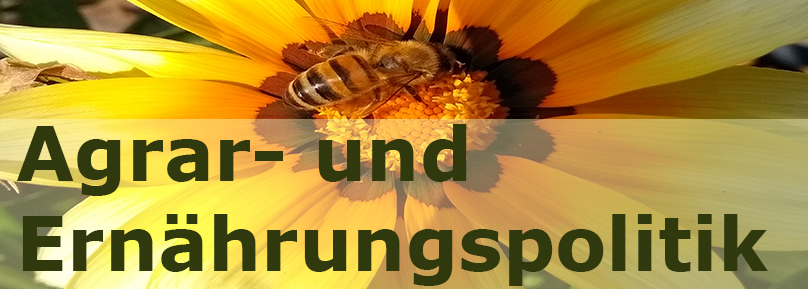Direkt zum InhaltDirekt zur SucheDirekt zur Navigation
Themen abgeschlossener Masterarbeiten (Auszug)
ab WiSe 2022/23
Wintersemester 2024/25
- What are the contemporary narratives about the German industrial transformation? A comparative case study for the two federal states North Rhine-Westphalia and Thuringia
- Are microalgae the resource of the future? An analysis of the microalgae technological innovation system in Germany
- Lebensmittel-Großmarkthallen im Wandel: Eine vergleichende Fallanalyse der Governance-Systeme, Nachhaltigkeitsperformance und gesellschaftlichen Funktionserfüllung in Berlin, Hannover und München
- Exploring the issue of permanence of afforestation projects in the Voluntary Carbon Market
- Understanding Shifts in Kenya’s GMO Policy Debate. A Discourse Coalition Analysis
- Unpacking desirable futures and values of nature in the Spreewald Biosphere Reserve (in progress)
Sommersemester 2024
- German farmers grow wheat, barley … and environment? Explaining non-adoption of eco-schemes in Germany’s CAP strategic plan in 2023
- Transboundary commons governance. A comparative case study of the Amu Darya Basin before and after the construction of the Quosh Tapa Canal
- Resilienz von Grünlandsystemen mit Weidebewirtschaftung im Angesicht von Energiekrise und Inflation. Eine vergleichende Fallstudie in der Wesermarsch und der Havelniederung
- Del dicho a hecho: A gender approach to rural entrepreneurship from policy to projects. The case of Aragon, Spain.
- Revitalising Farmland Biodiversity: Evaluating the effectiveness of result-based payment schemes in Ireland.
- Labor Exploitation Dynamics of Dairy Contract Farming Schemes in a Colombian Agrarian Frontier
- Navigating the EU Sustainability Regulations: Challenges and Opportunities for Smallholder Cocoa Farmers in Western Côte D’ivoire
- Examining Agroecology Principles in the CAP 2023-2027: Assessing the Potential for Paradigm Shifts in the EU Food System
- Energy Transition and Social Movements in Germany: the Political Ecology of Bioenergy
- Hegemony and Power Asymmetries in the Pursuit of Sustainability: An Analysis of Palm Oil Phase-out in the European Union Biofuel Sector
- Perceptions and Strategies of War-Affected Syrian Farmers: The Case of Idlib
- The Effects of Cover Crop Adoption on Yield Distributions During Extreme Drought
- Sustainability and agroecology monitoring by private sector companies in the global rice value chain
- Positive Deviance Among Ivorian Cocoa Farmers: Identifying and Predicting Best-Performance Cases to Foster a Sustainability Transition in West African Cocoa Production
Wintersemester 2023/24
- Explaining Policy Change in Coastal Management. The case of managed realignment at the Baltic Sea in Schleswig-Holstein
- Imagining Anti-Wind Resistance in Formal and Informal Participation: A Critical Analysis of Institutionalized Styles
- Understanding Gendered Perceptions on Climate Risks and Security in Mindanao, the Philippines: A Participatory Appraisal Analysis
- Energy islands between dependency and isolation. Comparing the trajectories of Samsø and Orkney Islands
- Social Networks of Young Female Farm Managers: A Participatory Mixed-Methods Analysis in Schleswig-Holstein, Germany
- An Economic Analysis of Climate-Smart Agriculture Technologies in Tanzania
- Assessing the Relevance of Local Market Channels for Potato Diversity in the Peruvian Andes
- Revision of the EU LULUCF Regulation –Member State Positions and Their Impact
- How Taiwan Stopped Being the “Garbage Island” and Learned to Love Recycling
Sommersemester 2023
- The Functions of Innovation Policy. An Analysis of the Policy Mix Affecting the Lignocellulose Biorefinery TIS in Germany
- Die dualistische Rolle des Landwirts im Kapitalismus. Literaturbasierte Entwicklung eines Kategoriensystems
- Frames von Datensouveränität in der Debatte um die Digitalisierung der deutschen Landwirtschaft
- With Smart Villages Towards Sustainable Livelihoods? A Case Study on the Development of the Rural Non-Farm Economy in Remetea
- Anerkennungskonflikte im öffentlichen Diskurs zu Landwirtschaft, Gesellschaft und Politik in Deutschland
- Consumer acceptance of novel food production technologies: Exploring perceptions of Controlled Environment Agriculture among students in Berlin
Wintersemester 2022/23
- The relevance of proximities for innovative, sustainability-oriented collaboration in local agri-food supply chains
- High technology food production systems as an approach to addressing food security - A case study analysis in Australia
- The role of digitalization in the bioeconomy: A systematic literature review
- Assessing the Resilience Capabilities of Wheat Farming Systems in the Mashonaland region in Zimbabwe in Times of Multiple Crisis. A qualitative approach
